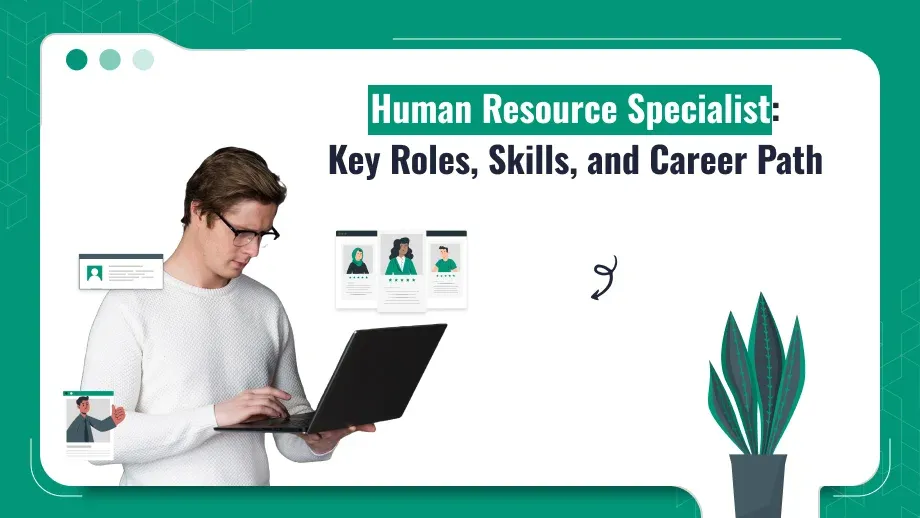
A human resource specialist essentially acts as a go-between for any given organization-answering questions from employees as well as management in order to act as a link between the two worlds. That is not all that is comprehended in this role; such a position also affects the culture of the workplace, ensures compliance, and encourages employee engagement. Some of those functions include recruitment, performance management, and developing policies and matching them to the organizational goals.
At the same time, there is a growing need for HR professionals, and, indeed, the human resource specialist’s role has never been more crucial. In the current emphasis on employee well-being and company culture within the workplace, HR specialists play a collaborative and advocacy role between employees and the organization. Bringing together a balance of HR generalist skills in the field of HR technical skills, HR specialists support businesses in running efficiently and creating a favorable work environment.
This article will discuss the crucial responsibilities, necessary skills, career tracks, and the role of an HR specialist to drive success within an organization. Being new to HR or looking to deepen your expertise in the knowledge of the role can give you a valuable edge for a successful career in human resources.
Key Responsibilities of a Human Resource Specialist
An HR specialist responsibility may vary significantly, depending on the size and structure of an organization. However, here are some of the core responsibilities that may apply to most roles of an HR specialist:
-
Talent Acquisition and Onboarding:
Human resource experts come up with the recruitment process, which must meet organizational needs and culture. From the job description to interviews, they get deeply involved in finding and bringing aboard top-flight talent. Effective onboarding by human resource experts ensures that new entrants into organizations integrate better, thus reducing turnover.
-
Employee Relations and Engagement:
employee engagement at work necessarily implies positive work engagement. HR professionals establish communication channels and resolve disputes and grievances. In these ways, even the early stages of issue resolution may prevent problems from becoming large and engaged employees.
-
Performance Management and Development:
Human resource specialists would help an employee improve his or her work through regular performance reviews, discussing what he or she needs to improve, and setting clear goals. They sometimes work with the management of an organization to formulate a professional development plan for the employees.
-
Compliance and Record-Keeping:
Another crucial aspect that HR specialists perform is compliance with labor laws and organizational policies. HR specialists are updated with the changing regulations of the law to shield employees from adverse legal situations and organizations from legal grievances. In addition, such accurate records help in accountableness and ensure proper transparency, which is very useful in managing risks.
Through these responsibilities, human resource specialist not only ensure smooth operations but also contribute to long-term organizational goals by managing and nurturing the company’s most valuable asset: its people.
Required Skills of Human Resource Specialist
A successful human resource specialist is essentially an HR generalist skills as well as an HR technical skills. A closer look at the required skills for human resources specialists demonstrates this:
- Communication Skills: Since an HR specialist needs to go through the employees at every level, therefore great communication skills are needed. He has to explain policies clearly, be capable of mediating conflicts, and listen to the requirements of the employees. Good communication helps bring true trust and smooth collaboration among all functions in an organization.
- Problem Solving and Conflicting Resolution HR: specialists are generally dealing with sensitive issues be it interpersonal conflicts or legal compliance. Critical thinking and fair solution development are the need of the hour. They must hence assess the situation in a rational manner so that the solutions developed for it are to the benefit of the employees as well as the organization.
- Organizational Skills: HR officials handle various responsibilities and work on different tasks every day. Be it tracking employee records or managing the recruitment schedule, an HR becomes much more efficient if they have some organizational skills.
- Technical know-how of HR software: Many organizations today will require human resource specialists to be technically up-to-date with regard to HR software. Tools like Cloud Based HRM Software simplify payroll processing, benefits administration, and compliance tracking processes, which free more strategic work efforts for the HR specialists.
- Empathy and Emotional Intelligence: People are what the field of HR is all about and, therefore, HR specialists need to understand the feelings and motivations behind those around them. Through this understanding, HR specialists can be empathetic and understanding to better answer the concerns of the employees and, therefore improve morale and build support in the work environment.
Gathering these HR generalist skills and HR technical skills readies an HR specialist to deal with the complexities of his or her role more effectively.
Onboarding with a skilled Human Resource Specialist boosts employee satisfaction by 3.5 times.
Upgrade your onboarding with Superworks!
Career Path and Growth Opportunities for HR Specialists
The professional career of an HR specialist can be quite rewarding and has tremendous growth and specialization opportunities:
-
Starting in Entry-Level Positions:
Career Starting Entry-Level Positions. Many HR professionals begin their careers by working as HR assistants or coordinators and, therefore, gain fundamental knowledge about HR processes, recruitment, and employee relations. This experience is invaluable because it lays the ground for more specialized jobs.
-
Progressing to Specialist or Senior Specialist Roles:
HR Professionals proceed in their careers to special- or senior-specialist positions. They can grow over time to become human resource specialists and focus on particular areas, such as talent acquisition, training and development, or employee relations. In such positions, they use their expertise to support broader organizational goals.
-
Certification and Skill Development:
Such professional certifications, like SHRM-CP or PHR, allow an HR specialist to develop his or her competency level, which in turn increases the scope of career opportunities. Advanced topics in the curricula include legal compliance, talent management, and strategic HR planning.
For individuals who are eager to advance their careers, HR leadership roles such as becoming an HR manager, HR business partner, or even Human Resource Practices are achievable. In these positions, the human resource specialist is directly embedded in the organization’s strategy; usually, they collaborate with other executives in driving company objectives.
-
Advancing to Leadership Roles:
For those looking to further their careers, HR leadership roles like HR manager, HR business partner, or even Human Resource Practices are achievable. In these positions, human resource specialist become involved in organizational strategy, working closely with other executives to drive company objectives.
As noted in the following sequence, being an HR specialist is a job in and of itself with so many growing opportunities.
Building Company Culture and Driving Employee Engagement
Organizational success depends on making its culture positive and representative. Here, the human resource specialist has an important role to play.
- Creating a Positive Workplace: HR professionals create policies and programs that foster a welcoming and inclusive work environment. This can include diversity initiatives, wellness programs, and professional growth and development opportunities designed to engage employees and motivate them to bring their best selves to the job.
- Engagement Strategies: The engagement of employees is maintained by talent management specialists with different engagement programs, including surveys, team-building activities, and developing their careers. All these programs help them feel worthy of the organization, and the turnover here will be minimal.
- Retention through a strong culture: A good work culture helps retain employees. HR experts utilize strategies to create jobs that satisfy the needs of employees, enhancing professionalism and building team cohesion. These approaches reinforce the conservation of human resources by minimizing turnover and increasing productivity.
A good workplace culture is one way to drive employee satisfaction and, by extension, organizational success.
Talent Acquisition and Retention Strategies
The most important job for an HR specialist is the recruitment and retention of skills and resources:
-
Talent Sourcing and Attraction:
HR specialists create an attractive advertisement for a job, attend job fairs, and work with recruiting firms to identify prospective candidates.Best HRMS Software in India is used for talent hiring, managing applications, and candidate progress.
A smooth onboarding process helps new employees adjust quickly to their roles and the company culture. HR specialists guide new hires through orientation, training, and initial performance reviews, which sets the foundation for long-term success.
A human resource specialist retains talent by designing employee development programs, mentoring, and a career advancement opportunity. Regular feedback, appreciation of employees, and team-building activities also enhance job satisfaction and loyalty.
Talent acquisition and retention strategies assist HR specialists in helping organizations create and maintain a skilled motivated workforce.
Compliance and Risk Management
The core tasks of an HR specialist ensure labor law compliance, and minimize risks:
- Labor Law Compliance: These professionals are updated with federal, state, and local labor laws so that the organization does not operate beyond legal boundaries. This compliance serves to protect against legal issues and financial penalties and damage the reputation of the company.
- Risk Management: Apart from strict compliance with legal standards, the HR people also strive to minimize other types of risks associated with the workplace, such as threats to the safety of the workplace and offenses by the employees. They may constantly scrutinize the books and train the employees on how to undertake safe practices or follow proper ethical standards.
- Documentation of Policies and Procedures: HR is hand in glove with proper documentation. HRMS Payroll Software in India helps professionals track all the employee data with proper records and reports against compliance and training. This documentation supports accountability and helps resolve potential disputes.
The focus of HR specialists on compliance and risk management protection is ensured to the employees and the organization through a safe and compliant work environment.
Positive Outcomes of Skilled HR Practices
When human resource specialist apply their skills effectively, the entire organization benefits:
-
Boosting Employee Satisfaction:
Through supportive HR practices, HR specialists establish a workplace where the value of employees is recognized. Such high levels of satisfaction breed better productivity and fewer absences from work, which results in a more harmonious team.
Effective recruitment and retention strategies help the HR specialist bring down employee turnover. Skilled employees retain costs for the firm and allow the organization to reap the benefits of already-experienced staff who better understand both the goals and values of the company.
-
Enhance Company reputation:
Organizations that adopt suitable HR Trends to have a good reputation in the industry, and they attract better talent. Employees are more likely to talk well about organizations, which enhances the company’s brand image and assists recruitment.
Results conservation of human resources Practitioners Working Toward Preserving Resources through Optimal Talent Management and Employee Support.
Conclusion
In essence, the human resource specialist has immense value for any organization with regard to managing all the essential human resource functions, and supporting health from a workplace culture perspective. It ranges from recruiting and compliance through employee engagement and retention and impacts the organization at all levels.
The greatest competitive advantage will be for those building or growing a career in HR, because of the broad HR generalist skills and HR technical skills. As more businesses continue to find value in quality human resources environments, Human Resources project management specialists are poised to drive not just employee satisfaction, but organizational success.






